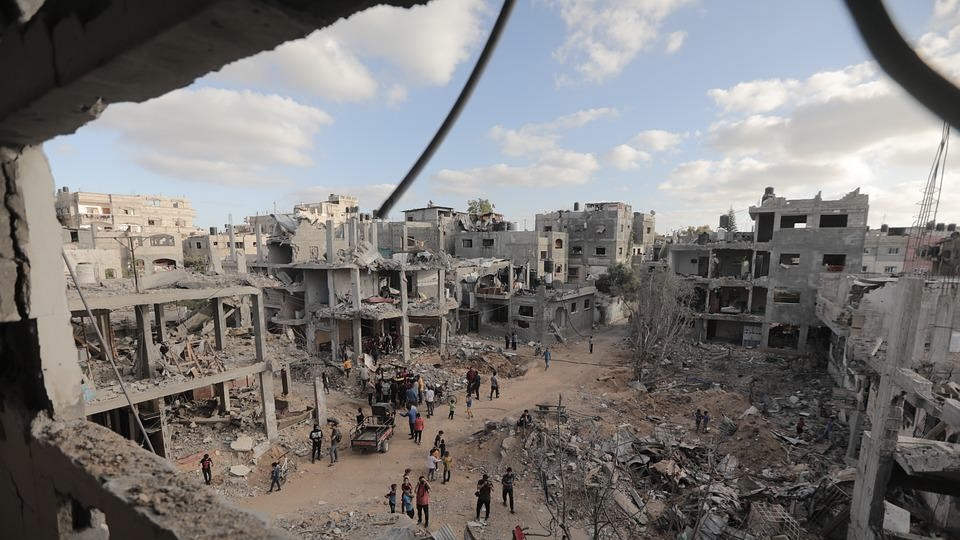Euro–Med Monitor stated that the humanitarian crisis in the Gaza Strip remains severe as the 17th year of the Israeli blockade nears its conclusion. Euro-Med called on all parties to apply pressure on the Israeli occupation to end its unlawful siege of the coastal enclave.
Euro–Med Monitor‘s report, “Generation under blockade,” highlighted that the Israeli blockade has caused 61% of the total population of over two million people in Gaza to suffer from poverty. Additionally, 47% of workers are affected by the blockade, leading to nearly 53% of the population experiencing food insecurity.
Israeli authorities continue to significantly limit the movement of people and goods into and out of Gaza through the Erez/Beit Hanoun and Kerem Shalom/Karm Abu Salem crossings. Exit permits are granted only for humanitarian cases and only after intense security examinations. Additionally, a wide range of essential materials and equipment for the health, commercial, and production sectors in Gaza are blocked from entering under security pretexts.
In the past 12 months, approximately 17,000 Gaza employees were given permission to work in Israel after going through tough security and administrative measures. Unfortunately, this is not sufficient to counter the economic plight in the region, which has been critically impacted by Israel‘s blockade, causing long–term harm to the humanitarian and economic sectors. Therefore, it is essential to remove all the limitations imposed on these areas, Euro–Med mentioned in a statement.
After nearly two decades of blockade, Euro–Med Monitor researcher Victoria Ceretti has noted the moral and humanitarian breakdown of all United Nations and international entities in regards to the people of Gaza. Two million people have been facing collective punishment in a confined and isolated area, with little to no response from the international community. The plight of those living in Gaza is not only for limited and short–term measures, but for the end of all restrictions that prevent them from having the same natural rights as those outside of the Strip.
Eight Gaza residents, including three minors, died in 2022 as a result of Israel‘s refusal to let them go through the Erez crossing for medical care. According to the report, the blockade has diminished the health sector drastically, with essential medicines down to 40%, medical items to 32%, and lab and blood bank supplies to 60%. Furthermore, the Israeli occupation disallow the import of medical equipment such as medical imaging tools and the parts to repair them.
The economic and commercial industries are grappling with multifaceted crises as a consequence of Israeli import–export rules, with hundreds of plants shutting down and thousands of laborers being let go because of a lack of raw materials and current fuel and electricity problems. The fishing market was also severely damaged due to Israeli attacks and constrictions, either by direct strikes on fishermen boats which happened at a rate of 30 assaults per month in 2022 – or indirect strikes such as the bar on exporting fish from Gaza to the West Bank, causing massive financial losses for fishermen.
Over the period between 2006 and 2022, Gaza‘s agricultural sector underwent a loss of around $1.3 billion due to the blockade and multiple Israeli military assaults. People affected by this were only recompensed for 30%. Even in 2022, the electricity crisis in the Strip stayed unresolved, with citizens receiving power for a maximum of 12 hours on a daily basis. The presence of electricity is reliant on the Kerem Shalom crossing being open for fuel imports (which Israel can shut down for security reasons anytime) and for Qatar to keep providing funds for the fuel required to power the Strip‘s sole power plant.
Euro–Med Monitor stressed the necessity for the Israeli occupation to terminate all limitations on the Gaza Strip, cease the practice of collective punishment on its inhabitants, and avoid using the security and political status as an explanation to persist in limiting the natural rights of Palestinians in the Strip, as relevant international conventions explicitly forbid collective punishment and obligate the occupying power to meet the humanitarian needs of the occupied people without any political or security conditions.
All relevant UN and international parties must fulfill their duties in protecting Palestinian civilians in the Gaza Strip, put pressure on the Israeli authorities to stop all forms of collective punishment, and require Israel as an occupying power to uphold all obligations towards Gaza’s population, as sanctioned by the relevant international norms, it added.
Shortlink for this post: https://daysofpalestine.ps/?p=34328







